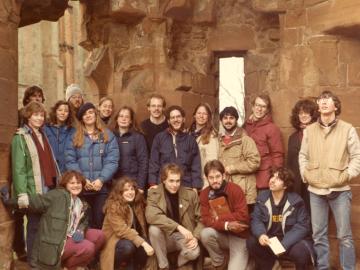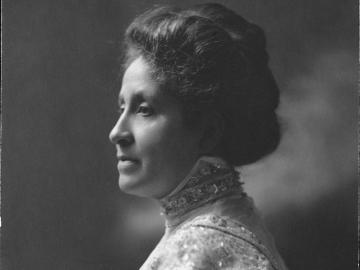Oberlin Alumni Magazine
Mister Rogers' Neighbor
February 13, 2025
Kate Mooney ’08

This story originally appeared in the Winter 2020 issue of the Oberlin Alumni Magazine.
Francois S. Clemmons ’67, a Grammy-winning opera singer founder of the Harlem Spiritual Ensemble, and the actor best known for portraying Officer Clemmons on Mister Rogers’ Neighborhood, has now added memoirist to his list of accomplishments. He released his first book, Officer Clemmons: A Memoir, in early May, which he feels was very good timing.
“People are reading more—and this is a period of time when people want to know the truth,” Clemmons says on a call from Middlebury, Vermont. The former Alexander Twilight Artist in Residence and director of the Martin Luther King Spiritual Choir at Middlebury College, Clemmons, now retired, has kept busy during quarantine. He is already working on his next manuscript, a book of nonfiction essays; participating in Black Lives Matter protests; and singing, always—even on the phone during interviews. Clemmons breaks out into “Far Away Places,” a favorite he sang with his mother while growing up and which inspired a love of travel, both literal and figurative, as he sought refuge in music and in the unconditional love he found in friendship with Fred Rogers.
Officer Clemmons chronicles a gay Black man’s lifelong search for a sense of belonging. “It’s a story of a young musician,” he explains, and of a place “where a young black boy can go to learn to be gay,” which Clemmons felt was missing in his formative years. Growing up in Alabama, and then Youngstown, Ohio, with an abusive father and stepfather, and a mother who couldn’t accept his sexual orientation, Clemmons spent years holding in his pain and denying his true sense of self. But from an early age, he learned that music gave him an emotional refuge.
Clemmons writes of his early bond with his grandfather, with whom he sang during his early childhood in Mississippi. His grandfather had a cane, which he convinced Clemmons— then nicknamed Little Buttercup—was the magic origin of music and tales of “Afrique.” “You can imagine for a child, we had such a secret, and I got so much joy out of it,” he recalls. Clemmons recaptured this experience in his children’s book, The Saga of Little ButterCup & the Majic Cane
“Fred Rogers told me he loved me, and it made all the difference. I stood up, I stopped bending over and hiding my face.”
When his grandfather went missing during a flood, never to return, Clemmons grieved and held onto the cane for comfort, until his family, concerned by the depth of sadness in such a young boy, took it away. “When they took the cane away from me, I burst into song. It was like a wound opened deep inside of me,” he says. This formative experience taught Clemmons “you do what you have to do to survive.” For him, that has been enduring struggles through spiritual song.
“I have a calling to sing these songs and to be involved in the arts,” Clemmons says. From singing in church choirs in Youngstown, to traveling to St. Petersburg, Russia, with the Oberlin College Choir, to traveling the world with the Harlem Spiritual Ensemble, Clemmons has honored the tradition of Negro African Spirituals.
During graduate school at Carnegie Mellon, while singing in the Third Presbyterian Church in Pittsburgh, Clemmons met Fred Rogers. Rogers was immediately impressed by Clemmons’ powerful voice and essentially recruited him for the role of Officer Clemmons on his show.
At first, Clemmons shied away from the opportunity. “I didn’t like those puppets, it seemed ridiculous to me, a grown man doing it,” he recalls. But he couldn’t pass up the chance to sing on one of America’s most beloved television programs and to be recognized worldwide for his voice. While at first the prospect of playing a cop went against his every intuition as a Black man in America, he felt proud that his role on the show communicated a “powerful anti-racist message” to viewers. And the friendship and mentorship between Clemmons and Rogers proved to be the great spiritual salvation of Clemmons’ life.
Clemmons describes Rogers as a surrogate father, the first man to care for him unconditionally. “When you’re loved, you become a person,” he says. “Fred Rogers told me he loved me, and it made all the difference. I stood up, I stopped bending over and hiding my face.”
When Martin Luther King was murdered and the streets of Pittsburgh erupted with despair, Clemmons was inconsolable. He remembers feeling “a deep sense of loss of something that could never be replaced.” Rogers and his wife took him in. “‘You’re going to come with us because we want you to be safe,’” Rogers told him.
“It was a moment of acknowledgement that I needed to be cared for, the first time I really felt that a man stood up on my behalf and said, ‘This is what you need.’”
In the end, the values of the Mister Rogers’ Neighborhood mirrored Clemmons’ own, an approach to living he hopes readers will take away from the memoir. “I wanted to be successful, hardworking, ‘love your neighbor as yourself,’” he says. ”Wasn’t interested in anything that didn’t belong to me, not robbing anything, and still have a full wholesome life.”
And no matter what, always singing through it.
Tags:
You may also like…
Voices Carry
March 13, 2025
Grammy-certified vocalist and viola da gamba player Ari Mason ’14 finds her niche in video games, films, and a vocal library.
London Calling
March 13, 2025
For Tracy Chevalier ’84, the Oberlin-In-London program was a magical, intense period of cultural and intellectual stimulation. As the beloved study-away experience celebrates 50 years, the New York Times best-selling author looks back on the semester she spent studying and living in London.
A Banner Held High
February 26, 2025
In 2018, Oberlin College named its main library after civil rights leader Mary Church Terrell, Class of 1884.


